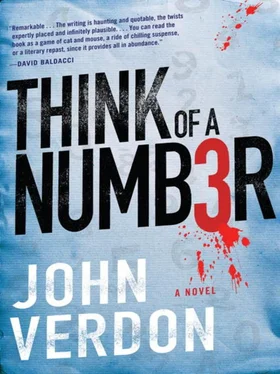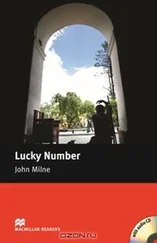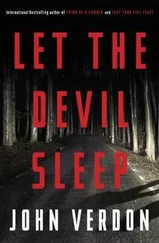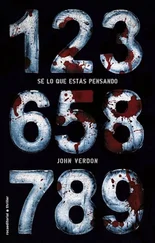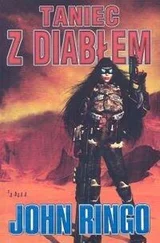“Why did he call you?”
“Ah. Good question. Seems that Detective Clamm heard about the murder up here in Peony. The similarity of the method prompted him to call the Peony police, who passed him along to the state police regional HQ, who passed him along to the captain overseeing the case, a nasty little ass-licking moron by the name of Rodriguez, whose brain is just large enough to recognize a lousy lead.”
“So he passed it along to you?”
“To the DA, who he knew would automatically pass it along to me.”
Madeleine said nothing, but the obvious question was in her eyes.
“Yeah, I knew it was an iffy lead. Stabbing in that part of the world is just another form of arguing, but for some reason I thought I might find something to tie the two cases together.”
“Nothing?”
“No. For a while it looked hopeful, though. The widow seemed to be holding something back. Finally she admits tampering with the crime scene. There was a flower on the floor that her husband apparently brought home for her. She was afraid the evidence techs would take it, and she wanted to keep it-understandably. So she picked it up and put it in a vase. End of story.”
“You were hoping she’d admit covering up some footprints in the snow or hiding a white lawn chair?”
“Something like that. But all it turned out to be was a plastic flower.”
“Plastic?”
“Plastic.” He took a long, slow swallow from the Heineken bottle. “Not a very tasteful gift, I guess.”
“Not really a gift at all,” she said with some conviction.
“What do you mean?”
“Real flowers could be gifts-they almost always are, aren’t they? Artificial flowers are something else.”
“What?”
“Items of home decor, I’d say. A man wouldn’t be any more likely to buy a woman a plastic flower than a roll of floral wallpaper.”
“What are you telling me?”
“I’m not sure. But if this woman found a plastic flower at the murder scene and assumed that her husband had bought it for her, I think she’s wrong.”
“Where do you think it came from?”
“I have no idea.”
“She seemed pretty sure he’d gotten it as a gift for her.”
“She would want to think that, wouldn’t she?”
“Maybe so. But if he didn’t bring it into the house, and assuming the son was out all evening with her as she claims, that would leave the murderer as a possible source.”
“I suppose,” said Madeleine with diminishing interest. Gurney knew that she drew a definite line between understanding what a real person would do under certain circumstances and airy hypothesizing about the source of an object in a room. He sensed he’d just crossed that line, but he pressed on, anyway.
“So why might a murderer leave a flower by his victim?”
“What kind of flower?”
He could always trust her to make the question more specific.
“I’m not sure what it was. I know what it wasn’t. It wasn’t a rose, it wasn’t a carnation, it wasn’t a dahlia. But it was sort of similar to all of them.”
“In what way?”
“Well, the first thing I was reminded of was a rose, but it was larger, with a lot more petals, more crowded together. It was almost the size of a big carnation or a dahlia, but the individual petals were broader than dahlia or carnation petals-a bit like crinkly rose petals. It was a very busy, showy sort of flower.”
For the first time since he’d arrived home, Madeleine’s face was alive with real interest.
“Has something occurred to you?” he asked.
“Maybe… hmm…”
“What? You know what kind of flower it is?”
“I think so. It’s quite a coincidence.”
“Jesus! Are you going to tell me?”
“Unless I’m mistaken, the flower you just described sounds very much like a peony.”
The Heineken bottle slipped out of his hand. “Holy Christ!”
After asking Madeleine a few pertinent questions about peonies, he went to the den to make some calls.
One thing leads to another
By the time he got off the phone, Gurney had persuaded Detective Clamm that it had to be more than coincidence that the eponymous flower of the first murder’s location had shown up at the second murder.
He also suggested that several actions be taken without delay-conduct an all-out search of the Rudden house for any odd letters or notes, anything in verse, anything handwritten, anything in red ink; alert the medical examiner’s office to the gunshot-and-broken-bottle combination used in Peony, in case they might want to take a second look at Rudden’s body; comb the house for evidence of a gunshot or material that may have been used to muffle one; re-search the property and adjoining properties and roadway between the house and the community fence for broken bottles, especially whiskey bottles; and start compiling a biographical profile of Albert Rudden to mine for potential links to Mark Mellery, conflicts or enemies, legal problems, or trouble involving alcohol.
Eventually becoming aware of the peremptory tone of his “suggestions,” he slowed down and apologized.
“I’m sorry, Randy. I’m getting out of order here. The Rudden case is all yours. You’re the man responsible, which makes the next move entirely your call. I know I’m not in charge, and I’m sorry for behaving like I am.”
“No problem. By the way, I’ve got a Lieutenant Everly down here who says he went through the academy with a Dave Gurney. Would that be you?”
Gurney laughed. He’d forgotten that Bobby Everly had ended up in that precinct. “Yeah, that would be me.”
“Well, sir, in that case I’d welcome any input from you at any time. And anytime you’d like to question Mrs. Rudden again, please be my guest. I thought you were good with her.”
If this was sarcasm, it was well concealed. Gurney decided to take it as a compliment.
“Thank you. I don’t need to talk to her directly, but let me make one small suggestion. If I happened to be face-to-face with her again, I would ask her in a very matter-of-fact way what the Lord told her to do with the whiskey bottle.”
“What whiskey bottle?”
“The one she may have removed from the scene for reasons best known to herself. I’d ask about it in a way that suggests you already know that the bottle was there and that she removed it at the Lord’s urging, and you’re just curious to know where it is. Of course, there may not have been any whiskey bottle at all, and if you get the sense that she really doesn’t have a clue what you’re talking about, just move on to something else.”
“You’re sure this whole deal is going to follow the pattern of the Peony thing-so there ought to be a whiskey bottle somewhere?”
“That’s what I’m thinking. If you don’t feel comfortable approaching her that way, that’s okay. It’s your call.”
“Might be worth a try. Not much to lose. I’ll let you know.”
“Good luck.”
The next person Gurney needed to talk to was Sheridan Kline. The truism that your boss should never find out from someone else what he should have found out from you was true-times-two in law enforcement. He reached Kline as he was en route to a regional conference of district attorneys in Lake Placid, and the frequent interruptions caused by the spotty cell-phone coverage in the upstate mountains made the “peony” connection more difficult to explain than Gurney would have liked. When he was finished, Kline took so long to respond that Gurney was afraid he’d driven into another dead transmission area.
He finally said, “This flower thing-you’re comfortable with that?”
“If it’s just a coincidence,” said Gurney, “it’s a remarkable one.”
Читать дальше
